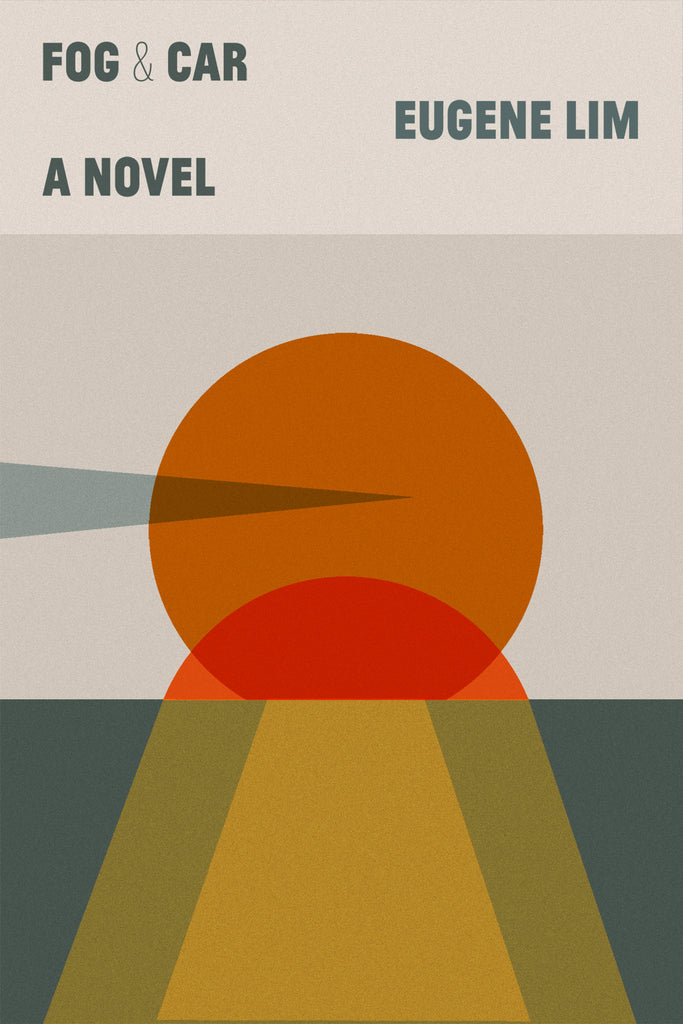 Reviewed by David Lewis
Reviewed by David Lewis
Fog & Car
by Eugene Lim
Coffee House Press
July 2024, $17.95, 224 pages, ISBN: 9781566896931
Ennui is one of the great themes of literature and there’s an abundance of books about existential malaise when faced with the relentless demands of everyday life. But they can easily lend themselves to a posturing tone; as if the author were inviting to the reader into a fraternity of superiority, so we can all unabashedly judge anyone who hasn’t figured out the big joke that is modern life.
Not so with Fog & Car. After Jim Fog and Sarah Car’s divorce, they embark on their new separate lives and journeys of self-discovery. But their stories aren’t psychological epics of self-aggrandizement. After their divorce, their internal conflicts express themselves through action, but primarily of the mundane sort: a list of household chores or a long day of work. This is so pronounced that, early in the book, I found myself seeing the characters as examples of Andy Warhol’s famous statement: “just being alive is so much work at something you don’t always want to do […] the machinery is always going. Even when you sleep.” In simply living, Jim and Sarah are literally doing the work necessary to understand themselves. Eugene Lim quite cleverly pivots their stories on their growing acceptance that their lives don’t constitute a hero’s journey, that they aren’t exceptional.
Anyone could relate to Jim Fog’s realization of this:
I was not who I had thought I was. The revelation was no less painful because it was common; it was specifically painful because it was common. Seeing myself incapable of succeeding in my ambitions, I was forced to turn practical. I saw it as a step down. I had so admired my friend and my wife, who did otherwise. But there, it seemed, it was. That weekend, looking at my options with a cold eye, I finally accepted my new course, determined now not to lose everything.
But since I was turning practical, I tried to remember that self-knowledge was a myth of varying degrees of falsehoods. (97-98)
There’s such a wicked irony to how Jim’s new self-awareness leads to the conclusion that “self-knowledge [is] a myth of varying degrees of falsehoods.” And then he meets Judy, a librarian with a mysterious past as a performance artist in New York. Jim is “wary of turning her into a symbol” of his entrance into a new life, but Judy alters the nature of his unchanging routine, slowly surrounding it with an aura of the fantastic. Even more impressively, she does so without him noticing. This raises the question, is happiness a product of elusive self-knowledge or of someone else knowing you better than you know yourself… and still loving you?
But wait. We can’t shelve this book in the romance aisle just yet. Sarah Car’s story is much more active than Jim’s. After the divorce, she moves to New York City and gets a temporary bar job before finding work as:
a freelance fact-checker, copyeditor, technical writer. Which means she’s a hack-of-all-trades and paid like a dishwasher. Well, she had aimed for the land of Edginess and ended up in the limbo of Ambitionless. Enough of what passed for middle class street cred to get her through anonymous bar talk, but not much else. (100)
While Sarah is living the bohemian dream of many literature students, her life is still unexceptional. The act of living in New York City gives her “middle class street cred,” but no real substance to her life. As Titus Andromedon from Unbreakable Kimmy Schmidt said: “Escaping [to New York] is not the same as making it, Kimmy.” The big city life you imagine is rarely the one you’ll get.
Sarah believes she’s autonomous and free until she sees an old friend of Jim’s, Frank Exit, on the street. She notices that he’s changed drastically, but he doesn’t recognize her. That dissuades her from making contact with him, but it also inspires her to follow him for days, feeling that this encounter has opened up a part of her past that she must deal with. Trailing Frank leads her down a surreal rabbit hole with homeless stalkers, psychic madams, soul swapping rituals and wedding ceremony bacchanals… All of which are extraordinary, yet also feel commonplace.
This twinning of the fantastic with the mundane is subtle, until it isn’t. Eugene Lim has buried a layer of magic deep below the surface of the early chapters and it rises slowly as the narrative progresses. When it finally surfaces on the page, it shimmers along the edges of Sarah and Jim’s lives, turning the banal into the weird and supernatural. And in the end, this feels as natural as the other binaries we find in the book: without despair, there’s no hope; without anger, no love. While these characters lead unremarkable lives, they live remarkably. And that’s what Fog & Car does a wonderful job of showing: the rare heroics of the ordinary.
About the reviewer: David Lewis’ reviews and fiction have appeared or are forthcoming in The Los Angeles Review of Books, Joyland, The Masters Review, Barrelhouse, Strange Horizons, The Weird Fiction Review, Ancillary Review of Books, 21st Century Ghost Stories Volume II, Chelsea Station, The Fish Anthology, Liars’ League London, Willesden Herald: New Short Stories 9, Fairlight Books, Paris Lit Up and others. Originally from Oklahoma, he now lives in France with his husband and dog.